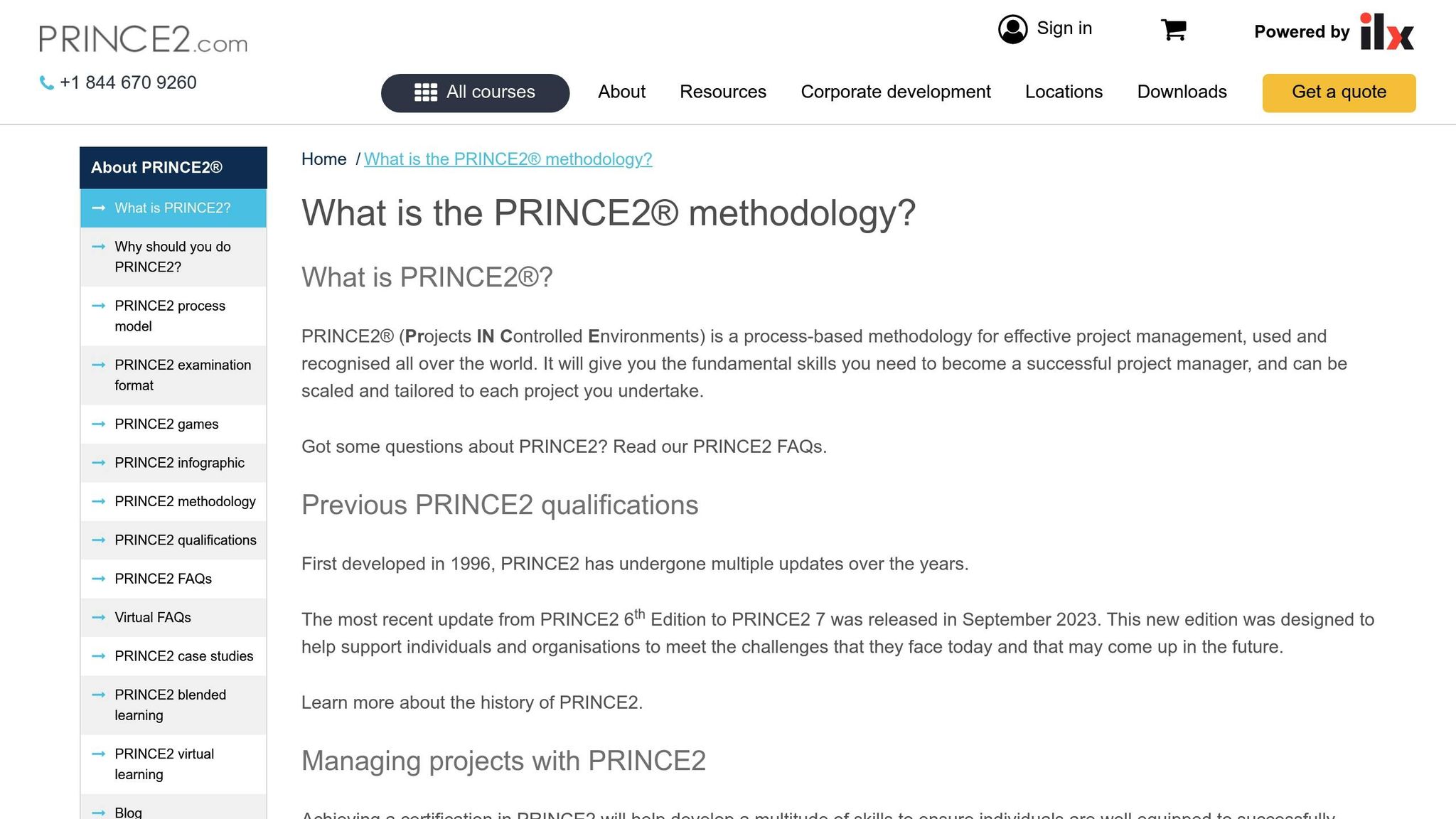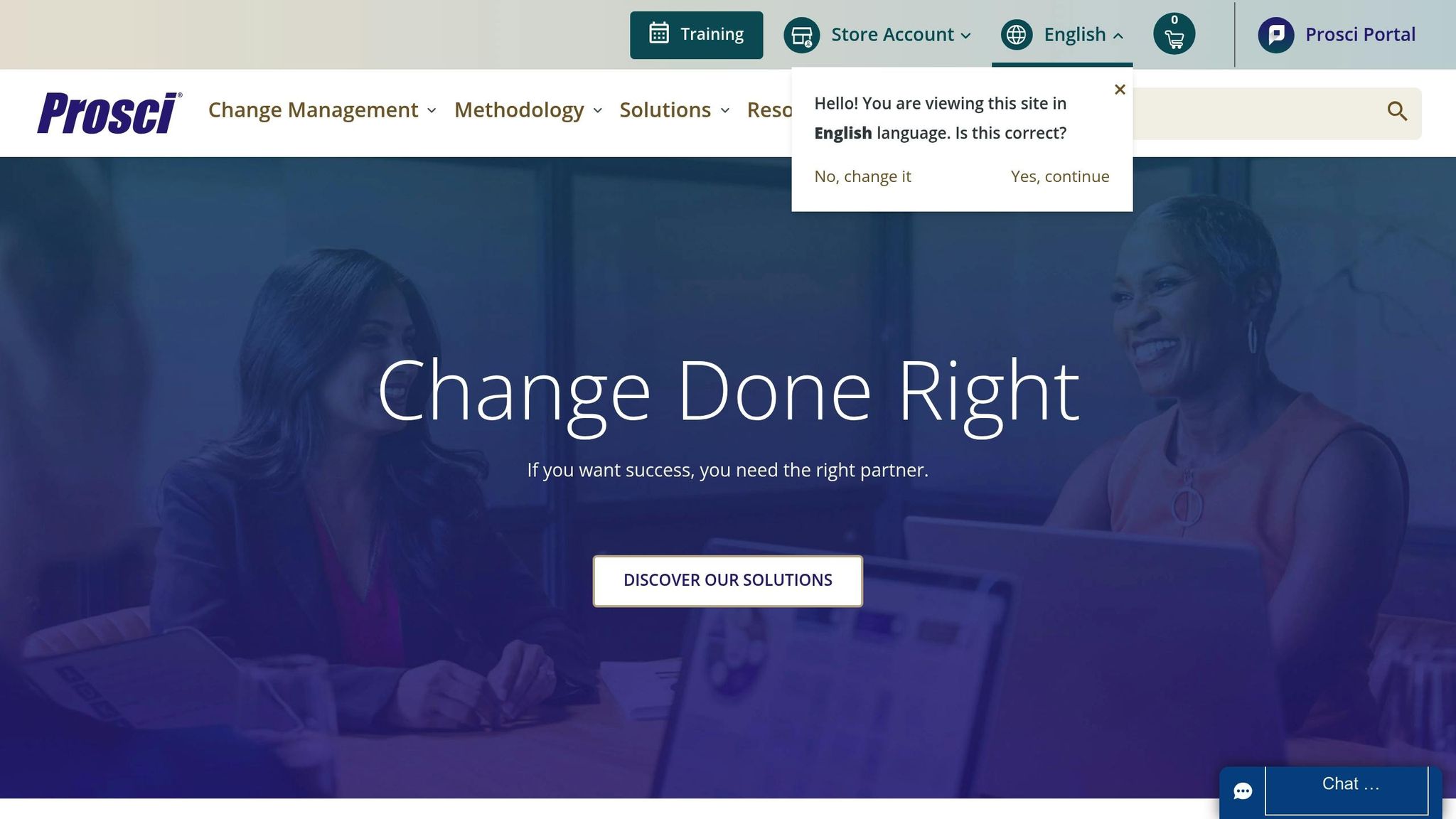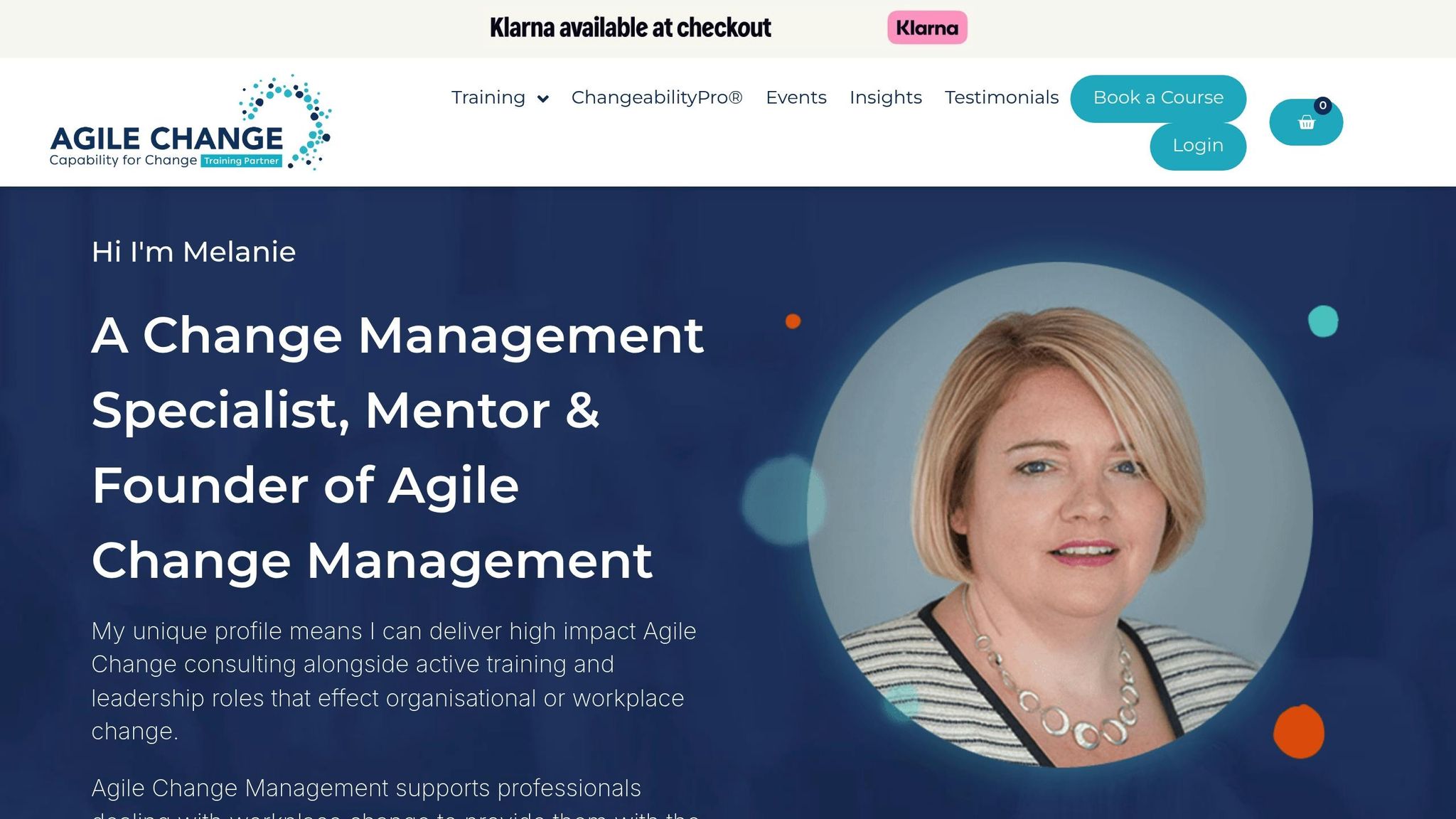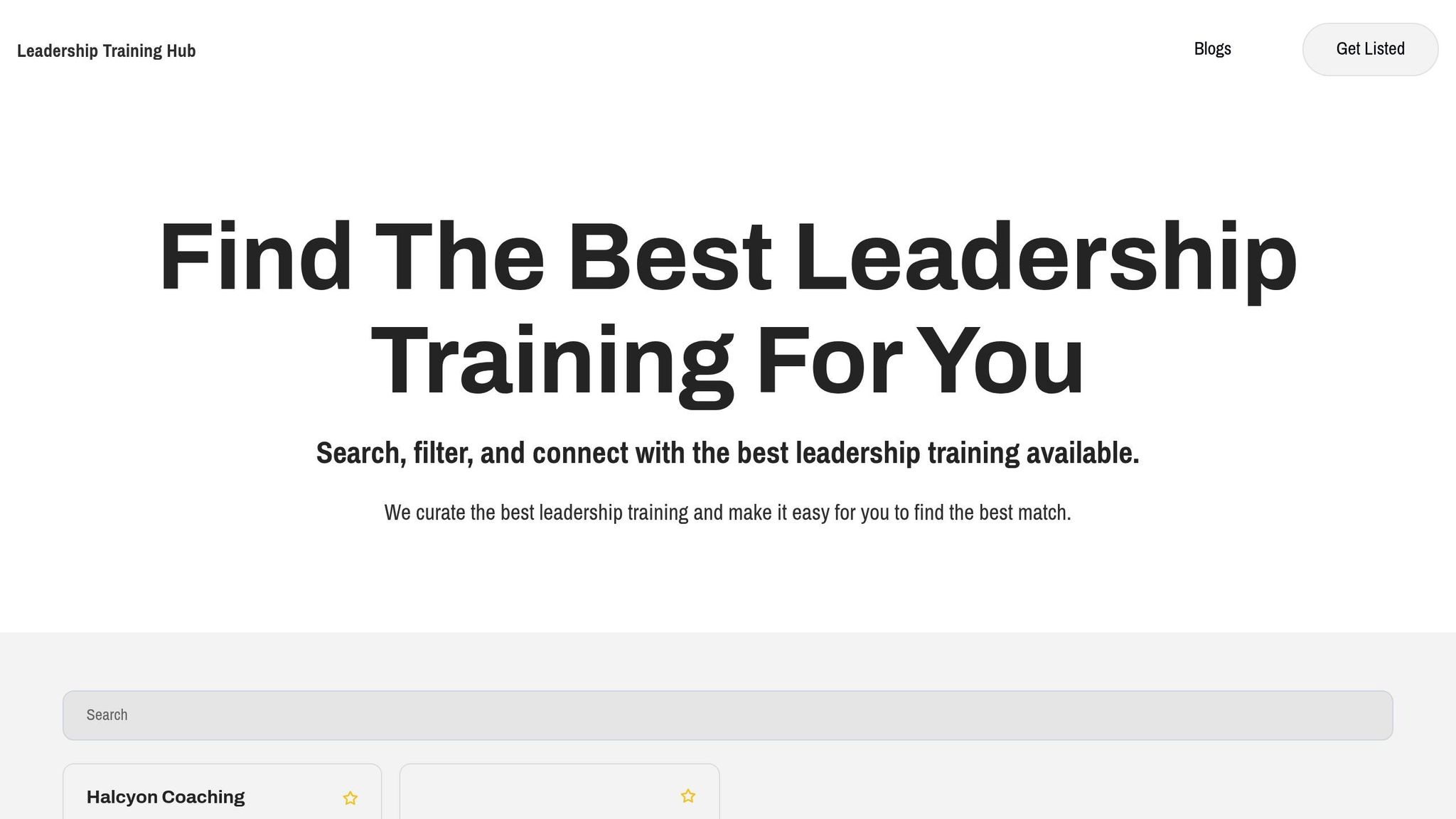In the UK, navigating change effectively is critical for organisations facing challenges like digital transformation and market shifts. This article reviews eight change management training programmes, each offering different methodologies, formats, and price points. From beginner-friendly online courses to advanced certifications for seasoned professionals, these programmes cater to diverse needs. Here's a quick overview:
- Learning247 Foundation: Self-paced online course focusing on structured change methods.
- APMG Foundation & Practitioner: Certification programme with flexible delivery options and practical tools.
- PRINCE2® Foundation + Practitioner: Combines project and change management for structured transitions.
- LBTC Change Management: Tailored for senior leaders managing large-scale changes.
- Prosci Change Practitioner: Focuses on the ADKAR model, blending theory with live project work.
- ACMP CCMP: Globally recognised credential for experienced professionals.
- Agile Change Agent/Coach: Merges agile practices with neuroscience insights.
- Leadership Training Hub: Directory of training options offering varied methodologies.
Each programme differs in cost, delivery style, and target audience, ensuring there’s an option for every professional or organisation. Below is a comparison table to help you decide.
Change Management Foundation and Practitioner - Are they right for you? A day in the life of...
Quick Comparison
| Programme | Delivery Format | Duration | Price (GBP) | Certification | Best For |
|---|---|---|---|---|---|
| Learning247 Foundation | Online self-paced | 12 hours | £300–£500 | Foundation Certificate | Beginners or flexible learners |
| APMG Foundation & Practitioner | Online/In-person | 3–5 days | £799–£2,299 | UKAS-accredited certifications | Professionals managing change |
| PRINCE2® Foundation + Practitioner | Blended learning | 5–7 days | £1,500–£2,500 | Dual certification | Project and change managers |
| LBTC Change Management | In-person/Online | 90 CPD hours | £800–£1,200 | Professional certificate | Senior leaders |
| Prosci Change Practitioner | Online/In-person | 3 days | £2,800–£3,300 | Global certification | Change leaders and project managers |
| ACMP CCMP | Self-study + exam | Flexible | £500–£750 + training | Credential for experienced pros | Experienced change professionals |
| Agile Change Agent/Coach | Virtual workshops | 2–4 days | £1,000–£1,800 | Agile certification | Agile environments and modern approaches |
| Leadership Training Hub | Directory access | Varies | Free to browse | Programme-dependent | Exploring multiple training options |
Choosing the right programme depends on your career goals, experience level, and organisational needs. Whether you're just starting or managing complex changes, there's a course to fit your requirements.
1. Change Management Foundation Online Training Course (Learning247)

Learning247's Change Management Foundation course equips professionals with structured approaches to handle organisational changes effectively. The programme focuses on techniques that reduce resistance and deliver clear, measurable results during transitions.
Delivery Format
This course is entirely self-paced and online, making it accessible across desktops, tablets, and mobile devices. It includes interactive exercises to help reinforce learning. All that's needed is an internet connection - no travel required. The platform is designed to work seamlessly on Windows, macOS, iOS, and Android devices, ensuring learners can engage with the material wherever they are.
Duration
The course takes approximately 12 hours to complete and remains accessible for 12 months after enrolment.
Price (GBP excl. VAT)
Pricing details are not provided, but the self-paced nature of the course suggests it could be a cost-effective option.
Key Methodologies/Frameworks
The training introduces structured change management models, highlighting the difference between prescriptive approaches for specific challenges and flexible frameworks adaptable to various scenarios. Key areas include stakeholder alignment, early engagement, effective communication, and setting measurable goals. The course balances technical strategies with the human aspects of change, helping participants achieve timely and scalable outcomes.
Target Audience
This course is ideal for both beginners and seasoned professionals looking for a flexible way to formalise their change management expertise. Upcoming sections will explore other programmes, each offering distinct methods and benefits.
2. Change Management – Foundation & Practitioner (APMG International, Acudemy Training)
The Change Management programme from APMG International, delivered through Acudemy Training, offers a structured two-level certification process. It draws on The Effective Change Manager's Handbook and the Change Management Institute's Change Management Body of Knowledge (CMBoK). This programme equips participants with both the theoretical knowledge and practical skills needed to navigate organisational change effectively.
Delivery Format
Acudemy provides flexible learning options, including small, in-person workshops at its Central London centre and a Virtual Live Classroom for those who prefer remote learning.
Duration
The combined Foundation and Practitioner programme is completed in just five days. This intensive schedule allows professionals to enhance their change management skills without requiring extended time away from work.
Key Methodologies and Frameworks
The course explores a variety of methodologies, such as Agile, Scrum, Lean, Six Sigma, PRINCE2, ITIL, PMP, and Waterfall.
- At the Foundation level, participants learn about organisational transformation, key roles, stakeholder engagement strategies, and the differences between planned and emergent changes.
- The Practitioner level focuses on selecting appropriate process frameworks, preparing teams for transitions, and defining roles, skills, and activities essential for ongoing change.
Target Audience
This programme is tailored for professionals involved in managing organisational change. It is particularly beneficial for:
- Change Managers
- Business Change Managers
- Project/Programme Managers
- Senior Responsible Owners
- Operational Line Managers
- Human Resource Managers
- Change Agents
It’s also a great fit for team members considering a career in change management.
Certification Outcome
Participants who complete the programme successfully earn the APMG International Change Management Foundation and Practitioner certifications. These credentials validate their ability to manage the impact of change and lead transformation initiatives within organisations .
Programme Schedule
Upcoming 2025 course dates include:
2nd–6th June, 7th–11th July, 4th–8th August, 1st–5th September, 6th–10th October, and 3rd–7th November.
The next section will explore another programme’s unique approach.
3. PRINCE2® Foundation + Practitioner (Axelos/PeopleCert)

PRINCE2® (PRojects IN Controlled Environments) is a process-driven approach to project management, seamlessly blending change management principles into its framework. The Foundation + Practitioner certification equips professionals with the tools to manage projects while navigating organisational transitions effectively.
Delivery Format
The programme caters to diverse learning preferences with several delivery options:
| Delivery Format | Description | Best For |
|---|---|---|
| Blended Learning | Online Foundation course paired with in-person or virtual Practitioner sessions | Those seeking a mix of self-paced and interactive learning |
| eLearning | Fully self-paced online learning with 12-month access | Individuals needing flexibility in their schedule |
| Classroom | Face-to-face sessions with expert trainers | Learners who benefit from traditional, interactive settings |
| Live Virtual Classroom | Real-time online classes with live interaction | Those who want structured learning without travel |
| On-Demand | Fully self-paced, 24/7 access | Learners requiring maximum control over their timing |
This range of options ensures that the programme fits various schedules and learning styles, making it accessible to professionals worldwide.
Key Methodologies and Frameworks
PRINCE2 7 defines change management as guiding an organisation from its current state to a desired future state, making it highly relevant for professionals dealing with transitions. The framework structures the project lifecycle while prioritising clear communication with stakeholders. It also covers essential areas like risk, quality, and change management, with these elements detailed in the project initiation document.
The methodology takes a comprehensive view, requiring consideration of multiple factors such as the changes a project delivers, the team's skill set, affected organisational areas, stakeholder relationships, transition methods, and resource allocation. This structured approach ensures that both project objectives and organisational changes are managed effectively, addressing the broader challenges of transformation.
Target Audience
The PRINCE2® Foundation + Practitioner programme is designed for professionals who manage projects alongside organisational change. This includes project managers, programme managers, change managers, and senior leaders responsible for driving transformation initiatives. It’s particularly beneficial for organisations where a structured project management methodology is critical for implementing successful changes.
Certification Outcome
The certification journey begins with the Foundation level, which introduces the principles, themes, and processes of the methodology. The Practitioner level then focuses on applying these concepts in practical, real-world situations. Participants develop key skills in areas like communication, leadership, planning, and risk management.
According to research, 88% of project professionals believe PRINCE2 has positively impacted their careers, and 97% of decision-makers report improved efficiency and employee satisfaction after adopting the methodology. For example, in 2023, technology company Kitron standardised its project management practices using PRINCE2 training delivered by ILX Group, creating a unified approach within their PMO.
"Using PRINCE2® training, delivered by ILX Group, we've been able to standardise practices across our organisation and establish a Kitron project approach that is used by everyone within the PMO." - Preben Saur, Project Manager, Kitron
PRINCE2 certification not only enhances an individual’s professional profile but also adds measurable value to organisations. Research shows that organisations leveraging change management are 47% more likely to meet their objectives compared to only 30% of those that don’t. By bridging project management and change management, this programme prepares professionals and organisations to excel in complex transformations.
4. LBTC Change Management (London Business Training & Consulting)
London Business Training & Consulting (LBTC) offers a specialised programme tailored for senior executives overseeing large-scale organisational changes. Their Advanced Strategic Change Management and Leadership course focuses on equipping leaders with the strategies and tools needed to navigate complex transformations effectively.
Delivery Format
This course is available in an intensive classroom setting, with an online option titled Advanced Strategic Change Management (Online) for those seeking more flexible learning. Classroom sessions are intentionally capped at nine participants, ensuring ample interaction and personalised guidance from trainers.
Duration
The programme spans 90 CPD hours, providing participants with an in-depth understanding of change management theories and practical strategies for implementation.
Key Methodologies and Frameworks
Participants are introduced to essential frameworks and tools, such as the PESTLE model for analysing external factors. The curriculum addresses critical areas, including managing resistance, assessing organisational culture, applying strategic leadership principles, diagnosing the need for change, and fostering cultural shifts to support transformation.
Target Audience
This programme is specifically designed for senior leaders and decision-makers, including Heads of Organisations, Chief Officers, Directors, and professionals in HR and Compliance roles. It is ideal for those responsible for driving organisational change.
Certification Outcome
Graduates of the programme gain the skills to lead with a strategic mindset, effectively mobilising both people and perspectives to achieve transformation. The certification emphasises strategic leadership over tactical approaches, enabling participants to address resistance, reshape organisational cultures, and align their teams with long-term strategic goals.
sbb-itb-fa39ac2
5. Prosci Change Practitioner Certification

Prosci's certification programme brings together a structured methodology and hands-on application, making it a standout option for those aiming to lead change effectively. By blending theory with real-world practice, it equips participants with the tools they need to navigate organisational change successfully. Additionally, participants receive ongoing support throughout their change management journey.
Delivery Format
This certification is available in online and in-person formats, each designed to provide an engaging and interactive learning experience. The online programme uses advanced digital platforms to foster engagement, with focused breakout sessions to encourage collaboration and discussion. Online sessions require participants to commit to 8 hours daily, plus an additional hour of self-study on the first two days. In-person sessions vary depending on the specific programme details. This flexible approach ensures accessibility while maintaining the depth of the methodologies taught.
Key Methodologies and Frameworks
The certification focuses on Prosci's well-established methodology, anchored in the ADKAR Model. This model helps individuals navigate five essential stages of change - Awareness, Desire, Knowledge, Ability, and Reinforcement - making it a powerful tool for personal transformation.
In addition to the ADKAR Model, participants learn to apply the Prosci 3-Phase Process, a structured framework for managing organisational change, and the PCT Model, which highlights the interplay between leadership, project management, and change management. These interconnected frameworks offer a comprehensive approach to managing change effectively.
Research underscores the importance of strong change management practices. For instance, initiatives with excellent change management are six times more likely to achieve their objectives. Furthermore, 79% of projects with highly effective sponsors meet their goals, and 81% of participants who plan for reinforcement activities report achieving or exceeding project objectives.
Target Audience
This certification is tailored for professionals tasked with leading change within teams or across organisations. It’s particularly relevant for change leaders, project managers, change management practitioners, and continuous improvement specialists. Others who can benefit include IT professionals, HR business partners, organisational development experts, and members of project teams.
"Prosci's methodology and role-based trainings are uniquely built to work just as well in the academic side of campus as they do on the administration side."
– Bernadette Han, Staff Education and Development, University of San Diego
Certification Outcome
Upon completion, participants earn the title of Prosci Certified Change Practitioner, signifying their expertise in applying change management methodologies. A key feature of the programme is its focus on immediate application - participants work on a live project during the course, ensuring their learning has a direct impact.
"The best training I've ever done! Really amazing balance of classroom training, collaboration, application and fun!"
– Jill Head, Senior Manager, Internal Communications and Engagement, Salesforce
6. ACMP Certified Change Management Professional (CCMP)
The ACMP Certified Change Management Professional (CCMP) offers a unique certification pathway instead of a traditional training programme. This globally recognised credential validates expertise in leading change and following best practices. Below, we explore its delivery format, methodologies, target audience, and outcomes.
Delivery Format
The CCMP certification requires candidates to complete 21 hours of approved change management training. This training is available in various formats - online, classroom-based, or self-paced - providing flexibility for different schedules and preferences.
Since 1 August 2024, the ACMP has broadened its acceptance of qualified self-paced programmes. This change accommodates applicants from different time zones or those without access to local Qualified Education Providers (QEPs). Self-paced courses must include knowledge assessments and offer mechanisms for learners to ask questions and receive responses.
To ensure quality, the ACMP relies on its QEP programme, which identifies courses that meet the certification's requirements and align with the Standard for Change Management©.
Key Methodologies and Frameworks
The CCMP certification is anchored in ACMP's Standard for Change Management, a comprehensive framework. Unlike proprietary methods, this framework is method-neutral, offering practices that can be applied across industries and roles.
The Standard outlines widely accepted processes and practices without prescribing specific tools or templates. The certification exam evaluates both theoretical knowledge and practical application, ensuring candidates can effectively use these principles in real-world situations.
Target Audience
This certification is ideal for experienced change management professionals aiming to validate their skills and enhance their professional standing. It is particularly relevant for consultants, project managers, organisational development specialists, and senior leaders managing complex change initiatives.
"A CCMP holder is a Change craftsman who can manage and implement the whole process not just a change Management theoretical scholar."
– Mohamed Elshoura, CCMP™ Certificant
Certification Outcome
Upon earning the CCMP designation, professionals demonstrate their expertise in leading change and their alignment with global standards. Certified individuals often enjoy career advantages, with reports of salary increases of up to 20% compared to their non-certified peers.
The credential boosts credibility when engaging stakeholders and provides a structured framework for tackling change management challenges. Many certificants have found that the CCMP opens doors to new opportunities and makes them stronger candidates for leadership roles.
"Achieving a certification issued by a worldwide and well-recognised professional association with a solid reputation allows me to align my consultant performance with top-trends and best practices as included on the ACMP's Standard for Change Management."
– Marisol Ortiz Arias, Director, Or-Tz Organisational Consulting
Additionally, the certification highlights a commitment to continuous professional growth, helping professionals articulate their expertise to leaders, project managers, and other stakeholders effectively.
7. Agile Change Agent/Coach and Neuroscience for Change (Agile Change Management)

The Agile Change Agent/Coach and Neuroscience for Change programmes merge agile practices with insights from neuroscience to help leaders navigate organisational change more effectively. These courses address the limitations of traditional change management approaches, offering tools designed for today's fast-paced business landscape.
Key Methodologies and Frameworks
The programme combines two core approaches: Agile Change Management and Neuroscience for Change. Agile Change Management focuses on iterative cycles that encourage experimentation and the continuous development of new ideas. Meanwhile, the neuroscience aspect examines how the brain reacts to change, leveraging neuroplasticity to enhance adaptability and motivation.
One of the standout frameworks used is Brain-Friendly Change. This method aims to minimise resistance, build influence, and ensure smoother transitions by balancing cautious and reward-driven behaviours through the behavioural inhibition system (BIS) and behavioural approach system (BAS). Practical techniques include:
- Breaking changes into smaller, manageable steps to ease cognitive load.
- Encouraging co-creation and practice in safe environments.
- Using social proof to reduce perceived risks.
These strategies provide a fresh perspective on managing change. Facilitator Michelle Teunis explains:
"Rather than seeing resistance as a problem, view it as the brain's natural response to change. The brain is an energy conservationist, so change requires more effort, particularly after 25, when neuroplasticity declines. By creating a positive perceived return on investment (ROI) for change – through clarity, simplicity, and small wins – Change Managers can encourage more people to engage rather than resist."
Target Audience
This programme is tailored for a diverse audience, including managers, HR professionals, technical staff transitioning into organisational roles, and senior change leaders across both private and public sectors.
Certification Outcome
The certifications offered through these programmes validate participants' practical skills and knowledge. The Agile Change Agent and Agile Change Coach certifications are based on the book Agile Change Management – a practical framework for successful change planning and implementation. These certifications confirm expertise in organisational change management and business skills at level 3. Successful candidates can use the titles "Agile Change Agent" or "Agile Change Coach" professionally, and the certifications do not expire.
The Neuroscience for Change course is accredited by APMG International, a globally respected certification body. It demonstrates advanced proficiency in change management practices, making it highly regarded across industries.
Participants frequently highlight the value of these certifications. Mark Pocock, Senior Manager at Vodafone, described the Agile Change Agent course as "very practical" with immediate workplace applications. Freia Muehlenbein, Growth Consultant, called it a "huge eye-opener" that transformed her approach to strategic projects. Regarding the neuroscience component, Janice Hendrick, Founder & Chief Connection Officer, praised the course for explaining "the science, implications for change efforts, and strategies for working with our nervous systems instead of against them". Marta Morawska, Change Lead, added:
"Neuroscience for Change confirmed some of the behaviours and brain reactions that I have experienced and observed while working on various change initiatives."
8. Leadership Training Hub (Directory)

Leadership Training Hub is an online platform designed to connect professionals with a wide range of change management training programmes, both in the UK and internationally. Rather than offering its own courses, the hub acts as a comprehensive directory, allowing users to explore and compare training options from various providers. Its purpose is to simplify the search process and help professionals find the right programme to meet their needs.
Delivery Format
The platform operates entirely online, offering users 24/7 access to browse and compare training options. Providers listed in the directory offer courses in a variety of formats, including in-person sessions, virtual classes, blended learning, and self-paced modules. Users can refine their search based on their preferred learning style, making it easier to find the most suitable option.
Price (GBP excl. VAT)
The directory offers different listing plans for training providers:
- Basic Plan: Free, with limited visibility.
- Boost: £299.
- Advanced: £999.
- All In: £2,999.
While end users can access the directory for free, the cost of individual training programmes varies depending on factors like course content, duration, and certification.
Key Methodologies/Frameworks
The directory showcases a variety of methodologies to address different organisational needs. These include frameworks like Lewin's Model, McKinsey 7-S, Kotter's 8-Steps, ADKAR, Nudge Theory, Bridges Transition, and the Kübler-Ross Change Curve. Programmes range from strategies for large-scale organisational transformations to those focused on smaller, project-specific changes. This diversity is particularly relevant given that nearly all organisations (99%) have undergone major changes in the past three years, yet McKinsey reports that 70% of such transformations fail.
Target Audience
The platform is tailored for a wide audience, including managers, executives, HR professionals, project managers, organisational development specialists, and others involved in leading or supporting change initiatives.
Certification Outcome
Certification options vary across the programmes listed. The directory allows users to filter for courses offering internationally recognised or proprietary certifications, ensuring that participants gain both practical skills and professional credentials. This flexibility helps professionals identify the training that best aligns with their specific organisational goals and career development needs.
Programme Advantages and Disadvantages
When considering change management training, it’s essential to weigh the pros and cons of different programmes to find the one that aligns with your career goals and organisational needs. Each type of programme comes with its own strengths and challenges, so understanding these trade-offs can help you make a more informed decision.
Online programmes, like Learning247's Change Management Foundation, offer the convenience of flexibility and affordability. They’re a great option for busy professionals juggling multiple commitments. However, since these courses are self-paced, they often lack interactive elements and networking opportunities. Success in these programmes also requires a high degree of self-discipline.
Instructor-led programmes, such as those provided by APMG International through Acudemy Training, provide more engagement and immediate feedback from experienced trainers. These courses are typically priced between £1,199 and £2,299, but the higher cost and fixed schedules can make them less accessible to some learners.
Certification-focused programmes, like Prosci's Change Practitioner Certification, come with globally recognised credentials based on the ADKAR methodology. These courses are priced at £2,800–£3,300, making them a premium option for those seeking a recognised qualification.
Experience-based certifications, such as the ACMP's CCMP, require participants to have three years of relevant experience and 21 hours of approved training. The exam fees range between £500 and £750, excluding training costs. While these certifications ensure participants bring practical, real-world insights, they are better suited to seasoned professionals.
Hybrid approaches, like the PRINCE2® Foundation + Practitioner course, combine project management and change leadership training. This offers a broad skill set by integrating two essential disciplines. However, the dual focus can make the learning process more challenging.
"When change initiatives fail (and they do so more often than not) they rarely fail on technical skills (hard skills), they fail on the people skills." - David A. Shore, Instructor at Harvard DCE
Here’s a quick comparison of some popular programmes:
| Programme | Delivery Format | Duration | Price Range (GBP) | Certification Outcome | Key Advantage | Main Limitation |
|---|---|---|---|---|---|---|
| Learning247 Foundation | Online self-paced | Flexible | £300–£500 | Foundation Certificate | Affordable and flexible | Limited interaction |
| APMG Foundation & Practitioner | Online/Instructor-led | 3–5 days | £799–£2,299 | UKAS‑accredited certification | Comprehensive methodology | Higher cost |
| PRINCE2® Foundation + Practitioner | Blended learning | 5–7 days | £1,500–£2,500 | Dual certification | Combines two disciplines | Complex focus |
| LBTC Change Management | In‑person/Virtual | 2–3 days | £800–£1,200 | Professional certificate | Practical application | Limited recognition outside the UK |
| Prosci Change Practitioner | Virtual/In‑person | 3 days | £2,800–£3,300 | Global certification | ADKAR expertise | Expensive |
| ACMP CCMP | Exam‑based | Self‑study + exam | £500–£750 + training | Professional credential | Experience-driven | Requires prior experience |
| Agile Change Agent/Coach | Virtual workshops | 2–4 days | £1,000–£1,800 | Agile certification | Modern methodology | Narrow scope |
| Leadership Training Hub | Directory access | Varies | Free to browse | Programme‑dependent | Broad comparison | No direct training |
The variety in delivery formats and durations means you can pick a programme that fits your schedule. Self-paced courses offer maximum flexibility but demand strong self-motivation, while intensive options like Prosci’s three-day certification require taking time off work for focused learning.
Some certifications, such as ACMP's CCMP and APMG Practitioner, also require periodic renewal - every three and five years, respectively - so keep this in mind when planning your long-term training strategy.
Finally, consider how well a programme aligns with your organisation’s preferred methodology. For example, if your team uses the ADKAR model, Prosci’s training might be the most practical choice. However, this specialised focus could limit your flexibility if you transition to a different role or industry. Balancing immediate learning goals with long-term career ambitions is key to making the right decision.
Final Thoughts
Selecting the right programme is all about aligning it with your career stage, the needs of your organisation, and your personal learning goals. The eight programmes we've discussed cater to a variety of professional needs, whether you're just starting out or looking to deepen your expertise in change management.
For those new to change management, options like Learning247's Foundation course or Prosci's ADKAR approach can provide a solid starting point. Prosci's methodology, in particular, offers detailed templates and a simple, step-by-step framework - perfect for building confidence when hands-on experience is still limited. The benefits of this investment are clear: organisations with structured change management practices typically experience productivity dips of only 15% during transitions, compared to a much steeper 45–65% without such approaches.
For experienced professionals, APMG International's certification stands out. It offers a broad range of tools and a practical approach to navigating organisational change. At about half the cost of Prosci certification, APMG provides flexibility by allowing practitioners to mix and match methods, which can be particularly useful for developing leadership skills.
Senior leaders managing large-scale transformations might find programmes that blend strategic and tactical elements more valuable. For example, the PRINCE2® Foundation + Practitioner combination delivers dual certification, while ACMP's CCMP credential equips participants with practical insights to tackle complex organisational challenges.
For organisations working within agile environments, Agile Change courses are worth considering. The Agile Change Agent course outlines how to manage change in a fast-paced setting, while the Agile Change Coach course builds on this foundation with hands-on implementation techniques. These courses cater to the growing need for adaptable and iterative change management approaches.
The business case for investing in quality training is hard to ignore. Research shows that projects with excellent change management are seven times more likely to meet their objectives. Moreover, the return on investment (ROI) for change management ranges from 3:1 to 7:1, meaning organisations can expect £3–£7 in returns for every pound spent. Given that 70% of change initiatives fail due to poor management, the importance of structured training becomes even more evident.
When it comes to delivery formats, self-paced online programmes are ideal for disciplined professionals juggling busy schedules. On the other hand, immersive options like Prosci’s three-day certification provide focused learning but require dedicated time away from work. If your team already uses the ADKAR model, Prosci's training can offer immediate practical benefits. However, if you prefer flexibility and exposure to various methodologies, APMG's wider range of tools might be a better fit.
Interestingly, nearly 75% of change management professionals have attended certification programmes, and 86% recommend pursuing certification. Structured training not only enhances career prospects but also equips professionals to lead successful transformations with tangible business outcomes.
Whether you're starting your journey or refining your skills, the key is to choose a programme that aligns with your organisation’s needs and your career goals. By doing so, you’ll be better positioned to implement change effectively and drive meaningful results.
FAQs
What should I consider when selecting a change management training programme?
When choosing a change management training programme, start by assessing your current skills and pinpointing the areas where you’d like to grow. Opt for programmes that address core elements like organisational alignment, stakeholder engagement, and proven change management frameworks.
It’s also worth considering how the programme fits with your organisation’s culture and the specific types of changes you’re navigating. Prioritise those that emphasise practical skills, such as improving communication, conducting impact assessments, and guiding teams through transitions. Selecting a programme tailored to your goals ensures it stays relevant and truly benefits your development.
What are the differences between the methodologies in these programmes, and how do I choose the right one for my organisation?
The methods used in change management training programmes can vary greatly. Some focus on structured frameworks, like Lewin's Change Management Model or the McKinsey 7-S Framework, which emphasise defined steps and aligning stakeholders. Others lean towards more adaptable approaches, such as Agile or Nudge theories, which encourage flexibility and creative problem-solving.
Choosing the right programme depends on factors such as your organisation’s culture, size, and the complexity of the changes you’re handling. If your organisation benefits from a step-by-step process, structured models might be the better fit. On the other hand, for businesses that thrive on adaptability, Agile or Nudge-based approaches could be a smarter option. The key is to pick a methodology that matches your organisation’s unique objectives and challenges.
Do I need any qualifications or experience to enrol in these change management training courses?
Most change management training programmes are accessible to anyone, with no need for prior qualifications or experience. That said, some certifications, like the CCMP (Certified Change Management Professional), come with specific requirements. For example, candidates may need a four-year degree and at least three years of relevant work experience.
For those just starting out, plenty of beginner-friendly courses are available. These typically emphasise core skills and practical tools, ensuring they're approachable no matter your previous experience.


